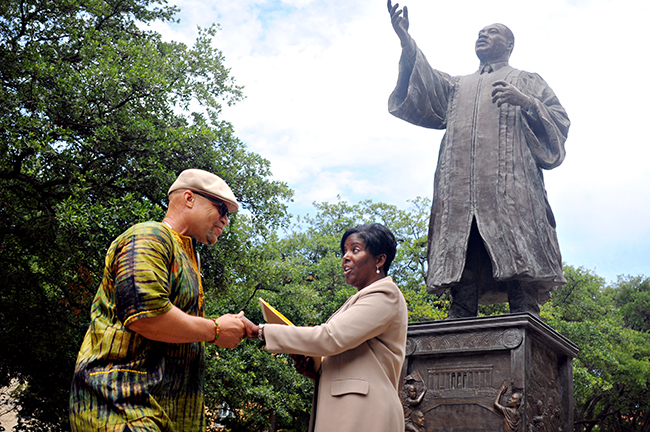Acting junior Sydnie Brown typically spends the Juneteenth holiday barbecuing at her family’s house in Houston. She’s keeping the gathering smaller than usual this year because of COVID-19 — spending time with just her parents and siblings rather than with other guests — but said she doesn’t expect the energy behind the day to be any different.
“We can't gather in large groups, but I'm still able to be connected with my family,” said Brown, a community engagement co-director for UT’s NAACP chapter.
Juneteenth is nationally celebrated as the official ending of slavery in the United States. This year, UT students are celebrating the holiday amid the COVID-19 pandemic and during the continuation of national protests for justice in the police killings of Black Americans, including George Floyd, Breonna Taylor and Mike Ramos.
Juneteenth recognizes the day in 1865 when Maj. Gen. Gordon Granger arrived in Galveston to declare the end of the Civil War and proclaim that enslaved people in the United States were now free. This proclamation came two and a half years after the Emancipation Proclamation was issued because the Union was unable to enforce the proclamation in the Confederacy in 1863. Many slave owners moved enslaved people and their plantations to Texas following the Emancipation Proclamation because of the scarce Union presence in the state, according to an essay by historian W. Caleb McDaniel.
Brown said though she’s always celebrated Juneteenth and understood the history behind it because of her family, she recognizes that’s not the case for everyone. She said it’s upsetting to her that she wasn’t really taught about the holiday in school.
“Enslaved people weren't free in Texas, they didn't know they were free, until today, in 1865,” Brown said. “It's a big deal. I feel like a lot of Black history is erased from the schooling system.”
She said this year, while there’s greater attention tuned to the Black Lives Matter movement, she predicts more people will do their research about Juneteenth and bring awareness to the holiday.
“I think Juneteenth will get more recognition this year, now that other activities aren't in the way, or distracting people from what's been happening to Black people in the world,” Brown said. "Just because we're in quarantine doesn't mean the energy behind Juneteenth needs to stop.”
Texas was the first state to deem Juneteenth a state holiday in 1980 through the efforts of African American state legislator Al Edwards. While 46 other states have since followed suit, Juneteenth is not an official federal holiday. Still, U.S. Rep. Sheila Jackson Lee, D-Texas, has pushed for 20 years to make it one. This year, her resolution to declare June 19 as Juneteenth Independence Day has more than 70 co-sponsors.
Interim University President Jay Hartzell sent a campuswide email Thursday acknowledging Juneteenth and the current national focus on race relations. Hartzell “officially suggested” University employees take Friday work hours to reflect and spend time with friends and family instead of conducting work activities to the extent possible. This is the first time University administration has acknowledged Juneteenth in this way, University spokesperson J.B. Bird said in an email.
“In light of the recent national events and the outrage in our community over racism and race relations, it was an appropriate step to take,” Bird said.
However, UT does not recognize Juneteenth as a University holiday. Bird said there are several state holidays including Juneteenth and Texas Independence Day that are not considered UT holidays to give University employees more time off around Christmas when students are away.
Athletic training sophomore Alexis Young said she knew about Juneteenth while growing up but didn’t understand the history behind it until she got to college. Like Brown, she said she thinks the current focus on the Black Lives Matter movement will motivate more people to seek out information about the holiday.
“I feel good that Juneteenth is able to actually get the recognition that it deserves while this Black Lives Matter movement is going on,” said Young, community engagement chair for the UT Black Student Alliance.
Young is also celebrating Juneteenth this year from Houston, where she’s staying in with friends. She said another year she might go to a party, but today, her plans are more laid back and involve increased social distancing.
Jeremiah Baldwin, a government and African and African Diaspora studies sophomore, serves on the organizing committee for an annual Juneteenth celebration in his hometown of Corpus Christi, complete with food vendors, music and guest speakers. This year, the citywide event was postponed because of COVID-19, he said.
Baldwin made alternative plans to celebrate the holiday with a small gathering of family and friends at home. He said he’s going to hang out, have some food and make a PowerPoint to educate his family about Juneteenth.
“It's really amazing to see a bunch of people learning about the history of Juneteenth and finding their own independent ways to celebrate,” said Baldwin, director of policy engagement for Afrikan American Affairs. “I encourage people to really take time and read articles (and) make sure it's not just a performative gesture — that people actually take time and learn about the true history of Juneteenth and how it's affected Black lives.”



















